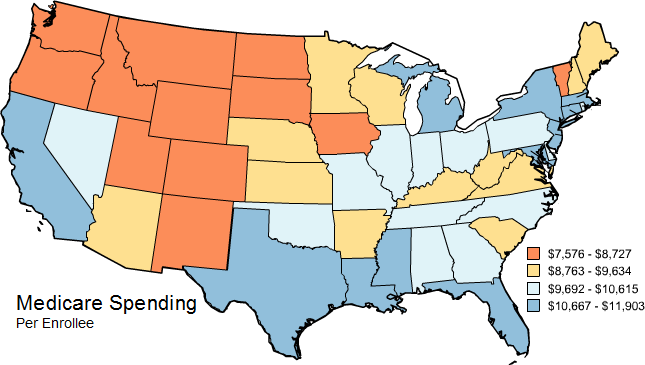Healthcare is getting more expensive. From my personal experience it also seems inefficient. I have been investigating public data about what is going on in the United States with healthcare. Here and in the previous post are what I've found.
 |
| Life expectancy |
States with high insurance rates are more likely to have citizens with longer life expediencies.
It could be argued that better healthcare helps people live longer. It may also be that those who live longer take better care of themselves.
Other factors at play are education and wealth.
 |
| Where money flows |
Those states with the highest spending per person on Medicare tend to be uninsured. This places a great burden on the state and nation in caring for them.
These federal and state transfers of wealth between citizens subsidize those in the greatest need.
 |
| Weighty matters |
Obesity is high in states with the most uninsured. Obesity-related conditions include heart disease, stroke, type 2 diabetes and certain types of cancer, which are some of the leading causes of preventable death.
In 2008, medical costs associated with obesity were estimated at $147 billion; the medical costs for people who are obese were $1,429 higher than those of normal weight.
Those who place themselves at the greatest health risks cost us the most.
 |
| Coughing it up |
Smoking takes a large drain on our healthcare resources. Adult smoking rates vary across the US, but the states with the most smokers are in the Midwest and Southeast regions.
Cigarette smoking has been identified as the most important source of preventable disease and illness.
About 8.6 million people in the U.S. have at least one serious illness caused by smoking. For every person who dies of a smoking-related disease, there are 20 more people who suffer from at least one serious illness associated with smoking.
 |
| Working for insurance |
Our standard in the United States is to have health insurance through our employment.
Unemployment seems to be a factor in healthcare rates, but is not necessarily the determining factor everywhere. These short term fluctuations in prosperity may only have marginal effects on the ability to obtain care.
The elderly especially are often not employed and therefore more reliant on government for care.
I will not pretend to have an answer for our healthcare challenges. My experience is that our system is inefficient. It is clear that healthcare costs are rising at the same time that access to care is decreasing.
More personal responsibility for our actions is required.
I believe we have a moral obligation to help those who can not help themselves.
Finding a balance that reduces expenses while improving care and access is good for the country.
Part 1 here.
Look to Canada and our Medical Plan, and health care. Everyone is treated equal. You can't beat it!
ReplyDeleteWhy are Americans so afraid, to look after their own people.
I just don't understand it.
You have obviously put a great deal of effort into these maps. What is not clear to me is what, if any, theme unites them. Are we supposed to look at the maps of one thing e.g. smoking and gain any information about Medicare costs, mortality, obesity, insurance coverage or any of the others?
ReplyDeleteThere is a doctor at the Indiana University School of Medicine who blogs as The Incidental Economist and you may find his writings useful as he has a deep interest in health care policy.
Thanks for the info on the Incidental Economist.
ReplyDeleteI do not know enough about health care to solve its problems. My hope was to shed light on the issues for others by presenting data in a unique way.